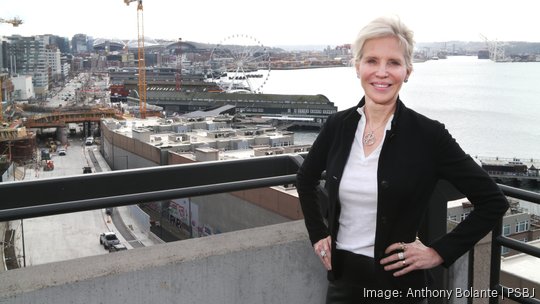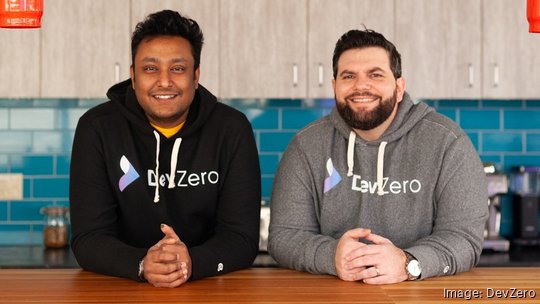Many successful companies have launched in times of crisis.
Uber, Airbnb and Venmo all got their starts during the Great Recession. Mailchimp and Blue Origin were founded during the 2000 to 2002 dot-com crash. Ocean Spray was born during the Great Depression.
Many leaders in tech contend great innovations come during economic downturns. Not only are laid-off workers freer to launch their startups, but many believe companies that can survive an economic downturn are frugal and focused, making them well-positioned for the future. With layoffs hammering big tech firms like Amazon and Microsoft, as well as private companies like Highspot and Flyhomes, it could be an ideal time for entrepreneurs to launch startups.
The reality is not so simple, however.
“We’ll see,” said Brendan Wales, general partner at Bellevue-based venture capital firm Fuse. “Maybe it ends up sparking a few people that were hanging on the ledge there, but usually those people, they literally can’t handle the corporate environment, so they leave to go start their business anyway.”
Startup glory debunked
Due to the extreme difficulty of launching a successful company, only a select few people will have the motivation to take the risk, according to Wales, and if they feel compelled enough to face that risk, it’s unlikely their employment status would be the deciding factor. If layoffs are going to spur a new crop of startups, Wales added, it would likely be in the enterprise software space where founders tend to have more experience and have spent time selling to larger companies.
“There’s a unique type of individual that wants to come to an early-stage startup and really build,” said John Baird, CEO and co-founder of the 5-year-old identity verification startup Vouched. “They want to roll up their sleeves. They want to do the work. They want to take this thing that is unknown and birth it into existence, and that is a challenging process.”

The challenges of launching a startup are well-documented. Josh Greene, CEO and co-founder of the coworking community Groove, wrote in a Medium post that his days often last from 9 a.m. to 11 p.m. Y Combinator co-founder Paul Graham once told a startup class: “Bad shit is coming. It always is in a startup.” LinkedIn co-founder Reid Hoffman has compared launching a startup to building an airplane while falling off a cliff.
CAUTIOUS INVESTORS: Venture capital activity cooled off last year after a red-hot 2021, according to numbers from PitchBook Data and the National Venture Capital Association. The firms’ fourth quarter 2022 report notes that venture capital activity “dropped off steeply between the first and last quarters of 2022.”
- $7.8B amount of venture capital Seattle-area startups landed last year
- 479 venture capital deals in the Seattle area last year
- $9.2B amount of venture capital Seattle-area startups landed in 2021
- 494 venture capital deals in the Seattle area in 2021
- $238.3B amount of venture capital deployed in the U.S. last year
- $344.7B amount of venture capital deployed in the U.S. in 2021
Even if someone does want to launch a startup, not everyone who gets laid off ends up on equal footing. This is especially true for tech workers in the U.S. on visas. For these employees, the clock is ticking for them to find new employment before having to leave the country, putting them at an extreme disadvantage to launch a startup if they lose their jobs.
Heather Redman, co-founder and managing partner of the venture capital firm Flying Fish Partners, said a lot of these immigrant employees are some of the best tech talent in the area, and losing them could come at a huge cost to the region.

Sean Sternbach is the co-founder of Seattle-based Venture Out, which offers a launch lab and a vetted network to help potential founders take the leap from big tech to entrepreneurship. He said he is noticing more interest in startups now, but much of this interest has been a long time in the making, with Covid and remote work making employees feel disconnected from their employers.
Still, layoffs can nudge entrepreneurs to launch a company, he added, especially if they have a generous severance package, but noncompetes pose a potential challenge. Employees who leave a big tech company to launch a startup that uses similar tech to their previous job could draw serious scrutiny, especially if that employee was a high-ranking executive, Sternbach said.
Even if a would-be entrepreneur is spurred to launch a startup after being laid off, there’s no guarantee that entrepreneurs would stay in Seattle when a job is no longer anchoring them.
Redman says it’s crucial to fix long-term issues in Seattle to make the region more attractive. Those issues, she added, include cost of living, transportation and the downtown living environment, an area she said not many people would choose to live in right now.
“We need to not be kidding ourselves about the competition for those folks as they lose the tether of the job,” Redman said.
WHO'S CUTTING? Some of the biggest tech employers in the country are trimming their workforces.
- Meta Platforms: The Facebook parent company announced in March it is laying off 10,000 workers. The company announced a previous round of layoffs, 11,000 workers, in November.
- Microsoft: The Redmond-based tech giant announced in January it was cutting about 10,000 employees. The company has laid off more than 2,000 employees in the state of Washington.
- Amazon: CEO Andy Jassy in January said the company would lay off more than 18,000 employees between cuts in November and cuts this year. Amazon laid off 2,300 local workers. In April, the company said it would cut another 9,000 jobs.
- Alphabet: The Google parent company said in January it will lay off about 12,000 employees.
The hidden impact
Where the layoffs are having an impact, Wales said, is hiring for startups. Experienced sales executives from big tech companies in the past would often turn down jobs at a startup when the compensation talks occurred, Wales said, but as those executives lose their jobs or find their stock options losing value, startups are looking more favorable.
Many startups follow a standard playbook in terms of hiring sales employees. Traditionally, Wales said, once a startup raises $5 million to $10 million, the founders will promote a high-performing sales rep to manage a new crop of sales employees. Now, startups can hire an experienced director of sales.
The effect could extend beyond sales roles. As big tech companies cut nonessential projects, engineers might lose interest if their whole days are spent working on less-exciting core projects. It could lead to tech employees leaving big companies if they feel like they aren’t getting to work on unique, cutting-edge projects anymore, Wales said.
“Those people will be like, ‘Well, I already made enough. Let me now work at a startup again and maybe go enjoy that ride,’” Wales said.
Sternbach said getting access to that talent is the really sweet spot for startups during big tech layoffs. Not everyone with decades of big tech experience has an idea, he said, but many still want to help build something new.
Many local founders agree. Maxim Fateev, co-founder and CEO of Temporal, said it’s now easier to close with certain candidates, and many who turned down Temporal in the past are reengaging with the company. Baird said the hiring market has vastly improved compared to early last year.
DevZero co-founder and CEO Debo Ray is noticing more initial applicants to jobs, even if those numbers thin out in later rounds of interviews. He added that layoffs in big tech can change remaining employees’ mindsets about their employer in a way that favors startups.
“I gave 120% to this business, and I delivered value to the end customers, and suddenly I know that one fine day I am very replaceable and expendable,” Ray said. “It’s not a good feeling. You want to go somewhere you feel valued.”

With a tougher funding environment, startups are forced to be careful with their existing cash. This downturn could create good habits and lead to new companies that are smart, frugal and scrappy, according to Matt McIlwain, managing director at Seattle-based Madrona Venture Group.
He notes that Smartsheet and Apptio, two big names in Seattle-area tech, were both young companies when the Great Recession hit, and they had to learn to deal with dire circumstances.
“The people who understand that every dollar ultimately demands a return and that it’s invested, they create a culture of smart frugality,” McIlwain said. “That combination is more likely to happen in a tougher environment for funding than in a permissive and easy environment for funding.”








